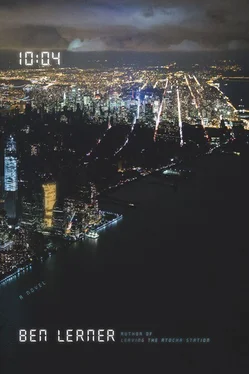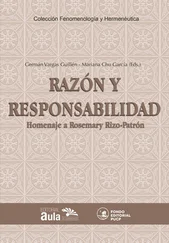It was not until we were standing on the platform and Roberto approached its edge to point out two soot-colored rats moving among the garbage on the tracks that I consciously registered the fact that I had never been so responsible for another person, at least not a young person. I’d babysat my nephews when visiting Seattle, but always in their home, never abroad in a crumbling metropolis; I’d carried a passed-out Alex back to her dorm from a party after we’d split a horse tranquilizer in college; I’d taken Jon to the emergency room three times for injuries he’d sustained through drunken athletic idiocy or defending his or Sharon’s honor in brief and clumsy fights, etc.; but none of my peers was a flight risk or a possible kidnapping victim. With a sinking feeling I realized that, if I were Anita, I might well have declined to entrust my child to my care. But then, Aaron had vouched for me: I was a published author.
I told Roberto to step back from the platform as the train approached and as soon as we sat down I showed him the notebooks I’d brought for jotting down our observations — the notebooks had been Alex’s suggestion — and explained our goals for the day in a tone that implied we were embarking on a solemn paleontological mission that would admit of no spontaneity, let alone insubordination. Roberto was particularly excited to see the display of an allosaurus skeleton positioned over an apatosaurus’s corpse as though it were scavenging and he kept leaping up from the seat to mimic the bipedal predator’s posture — he’d seen it on the Internet — and I kept telling him to sit down.
At West Fourth we caught the C and it was crowded. At Fourteenth a crush of new passengers entered the train and bodies imposed themselves between Roberto and me. I wondered if people would have stepped between us if we were racially indistinguishable; I pushed my way back to him and took his hand. This was the first time our bodies had come into willed contact in the many months of our relationship and he looked up at me, maybe with curiosity, maybe reacting to the sweatiness of my palm; we are going to stick together at all times, I said to him, noting the desperation in my own voice. To dispel it I smiled and complimented his red Jurassic Park T-shirt and asked him to remind me what giant sauropods most likely ate. While he enumerated prehistoric flora, I was thinking: holding his hand is the only permissible physical contact; if he were to run away from me, I couldn’t grab or otherwise discipline him; if he reported any form of restraint beyond hand-holding during transit, who knows what would happen; an undocumented family wasn’t going to call the cops, but his dad might run me over in the truck Roberto was always bragging about; they might report Aaron, who had let me enter the school without observing protocol. “You’re not my teacher,” Roberto had said on more than one occasion when I’d tried to force him to focus on our book; I imagined him exclaiming it in the museum and then disappearing into the depths of the bioluminescence exhibit, never to be seen again.
By the time we reached the Eighty-first Street entrance, I was debating two strategies: either establish a draconian presence at the outset of our visit that would deter all forms of noncompliance, promising to cut short the trip at the first infraction — that there would be trouble I now considered inevitable, although it had never worried me before — and threatening to call his mom, whose cell phone number I had, maybe even evoking Joseph Kony, but then, at the end of the visit, buying him whatever he desired from the gift shop, my largesse making me appear to him retrospectively benevolent; or I’d just skip the disciplinarian stuff and bribe him at every opportunity until the time I returned him, loaded with presents and full of artificial dyes, to his family, who now seemed a country away. As Roberto and I stood in line for tickets in the packed lobby, I devoted some small portion of my brain to chatting with the boy about museum highlights, some portion to objecting to the admission price, but most of my consciousness was working its way toward the horrible realization that I simply was not competent to take a prepubescent on an educational day trip. I could feel the urea and salts emerging from my underarms as I longed for Jasmine, whom I’d never met, or for Alex, whom all kids seemed instinctively eager to obey.
We bought our tickets and walked quickly through the Space and Earth displays, past the giant Ecosphere, which interested the child not at all—“No running, Roberto”—until we reached the steps and ascended to the fourth floor, where a guard directed us to the Orientation Center, starting point of the evolutionary path. How did this happen, I wondered, still catching my breath from the stairs, how is it that a thirty-three-year-old man who appears to meet most societal norms of functionality — employed (however lightly), sexually active (however irresponsibly), socially embedded (if unmarried and childless) — is in the grip of a fear so intense as to overwhelm reason as a result of taking a sweet kid to a museum? But as we began our journey along the circuitous path and through the Hall of Vertebrate Origins, Roberto pulling me by the arm as quickly as possible through the cases of jawless fish and placoderms toward the Hall of Ornithischian Dinosaurs, I had to question any account of myself as normative, mature. Thus began my second-order panic: not only was I horrified of something going wrong with Roberto, but I was horrified of being horrified, as it indicated my manifold inadequacy. I recalled the initial consultation with the fertility specialist when she’d asked about our mental health histories: while I’d had three protracted bouts of serious depression and plenty of anxiety, and while I’d had a long-term if intermittent relationship with SSRIs and benzodiazepines, there was no major mental illness in my family, and I thought of myself more as darkly ruminative and inclined to complain than as sufficiently disturbed to have implications for reproduction or parenting; Alex, who knew me as well as anyone, had obviously agreed. But now, as I heard myself command Roberto to write down every evolutionary advance the museum placards noted (“development of braincase”; “the palatal opening”; etc.), a highlight reel of my lower moments played before me.
I remembered the pavor nocturnus of my eighth year, my baffled brother trying to comfort me by offering his semiprecious baseball cards, although I was, with the exception of one frightening summer, a happy enough child. The more serious trouble started, as it often does, in college: tremors and numbness in my hands, the feeling that they belonged to someone else or were autonomous; the sense that if I did not will every breath, did not breathe manually, I would cease to breathe entirely; there among the primitive vertebrates, I experienced the echo of each symptom I recalled. Then there was splashing water on a face with which I failed to identify in the dorm, its blown pupils, or slowly coming to realize during an evening seminar on Thomas Hobbes that the irruption of hysterical laughter was my own; there was the episode of sleep paralysis and an attendant incubus hallucination so severe that I couldn’t shut my eyes without Alex’s company for several days (“Write ‘antorbital opening,’” I instructed Roberto; “write ‘three-fingered hand’”); I remembered weeping, although it never happened, as quietly as possible in a bathroom stall at a fancy restaurant in Madrid, my blood a patchwork of sertraline, tetrahydrocannabinol, clonazepam, and Rioja. All these lacrimal events and bouts of depersonalization were no doubt leading, I was then convinced, to the onset of schizophrenia. Indeed, the irony of my recent cardiac diagnosis was that it gave me an objective reason for my emotional turbulences and so was, in that sense, stabilizing: now I was reckoning with a specific existential threat, not just the vacuum of existence. But as a dozen proprioceptive breakdowns flashed before me in the museum, there was a reversal of figure and ground: I wasn’t a balanced person who had his difficult periods; I was an erratic blind to his own psychological precariousness; I was no more a functional adult than Pluto was a planet.
Читать дальше










